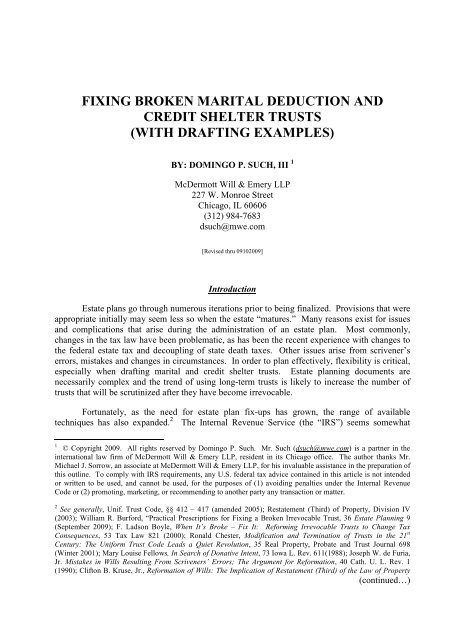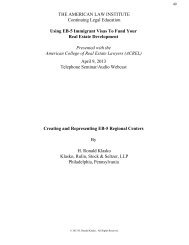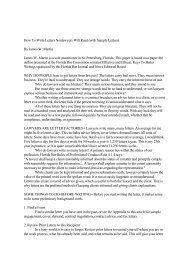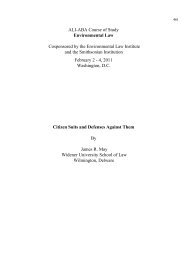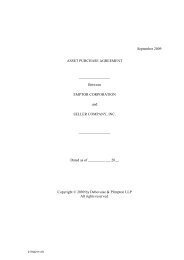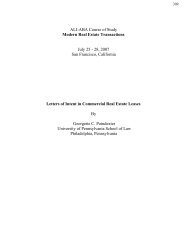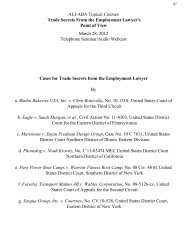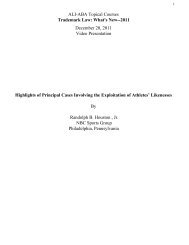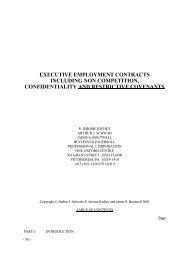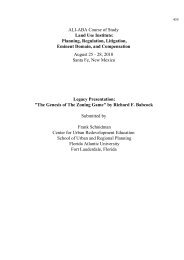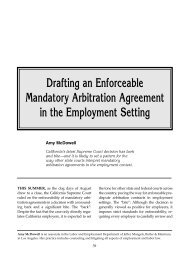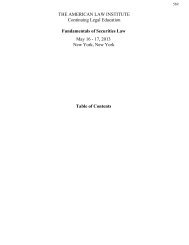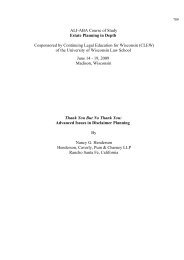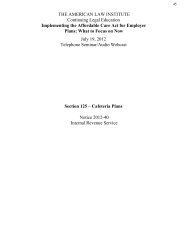fixing broken marital deduction and credit shelter trusts - ALI CLE
fixing broken marital deduction and credit shelter trusts - ALI CLE
fixing broken marital deduction and credit shelter trusts - ALI CLE
You also want an ePaper? Increase the reach of your titles
YUMPU automatically turns print PDFs into web optimized ePapers that Google loves.
FIXING BROKEN MARITAL DEDUCTION ANDCREDIT SHELTER TRUSTS(WITH DRAFTING EXAMPLES)BY: DOMINGO P. SUCH, III 1McDermott Will & Emery LLP227 W. Monroe StreetChicago, IL 60606(312) 984-7683dsuch@mwe.com[Revised thru 09102009]IntroductionEstate plans go through numerous iterations prior to being finalized. Provisions that wereappropriate initially may seem less so when the estate “matures.” Many reasons exist for issues<strong>and</strong> complications that arise during the administration of an estate plan. Most commonly,changes in the tax law have been problematic, as has been the recent experience with changes tothe federal estate tax <strong>and</strong> decoupling of state death taxes. Other issues arise from scrivener’serrors, mistakes <strong>and</strong> changes in circumstances. In order to plan effectively, flexibility is critical,especially when drafting <strong>marital</strong> <strong>and</strong> <strong>credit</strong> <strong>shelter</strong> <strong>trusts</strong>. Estate planning documents arenecessarily complex <strong>and</strong> the trend of using long-term <strong>trusts</strong> is likely to increase the number of<strong>trusts</strong> that will be scrutinized after they have become irrevocable.Fortunately, as the need for estate plan fix-ups has grown, the range of availabletechniques has also exp<strong>and</strong>ed. 2 The Internal Revenue Service (the “IRS”) seems somewhat1© Copyright 2009. All rights reserved by Domingo P. Such. Mr. Such (dsuch@mwe.com) is a partner in theinternational law firm of McDermott Will & Emery LLP, resident in its Chicago office. The author thanks Mr.Michael J. Sorrow, an associate at McDermott Will & Emery LLP, for his invaluable assistance in the preparation ofthis outline. To comply with IRS requirements, any U.S. federal tax advice contained in this article is not intendedor written to be used, <strong>and</strong> cannot be used, for the purposes of (1) avoiding penalties under the Internal RevenueCode or (2) promoting, marketing, or recommending to another party any transaction or matter.2 See generally, Unif. Trust Code, §§ 412 – 417 (amended 2005); Restatement (Third) of Property, Division IV(2003); William R. Burford, “Practical Prescriptions for Fixing a Broken Irrevocable Trust, 36 Estate Planning 9(September 2009); F. Ladson Boyle, When It’s Broke – Fix It: Reforming Irrevocable Trusts to Change TaxConsequences, 53 Tax Law 821 (2000); Ronald Chester, Modification <strong>and</strong> Termination of Trusts in the 21 stCentury: The Uniform Trust Code Leads a Quiet Revolution, 35 Real Property, Probate <strong>and</strong> Trust Journal 698(Winter 2001); Mary Louise Fellows, In Search of Donative Intent, 73 Iowa L. Rev. 611(1988); Joseph W. de Furia,Jr. Mistakes in Wills Resulting From Scriveners’ Errors; The Argument for Reformation, 40 Cath. U. L. Rev. 1(1990); Clifton B. Kruse, Jr., Reformation of Wills: The Implication of Restatement (Third) of the Law of Property(continued…)
accepting of these techniques. This outline explores the different methods currently available formodifying <strong>and</strong> changing <strong>marital</strong> <strong>and</strong> <strong>credit</strong> <strong>shelter</strong> <strong>trusts</strong>. Necessarily, state law will impact theterms of the <strong>trusts</strong> <strong>and</strong> will need to be examined.I. Saving the Marital Deduction 3A. Restrict Boilerplate Powers1. When drafting a <strong>marital</strong> <strong>deduction</strong> trust, restrict the traditional boilerplatepowers given to the trustee to avoid the impairment of the <strong>marital</strong><strong>deduction</strong>.2. In Revenue Ruling 69-56, 1969-1 C.B. 224, the IRS ruled that thefollowing fiduciary powers do not result in the disallowance or diminutionof the <strong>marital</strong> <strong>deduction</strong> if: (i) the governing instrument contains noprovision directing the fiduciary to favor the remainder beneficiaries overthe surviving spouse; (ii) the governing instrument does not preclude acourt of competent jurisdiction from imposing reasonable limitations uponthe exercise of the fiduciary powers in order to protect the survivingspouse’s interest; <strong>and</strong> (iii) the governing instrument does not evidence anintent to deprive the surviving spouse of the beneficial enjoyment of the<strong>marital</strong> trust property, as required by the Internal Revenue Code:a. To apportion or not to apportion, between successive beneficialinterests, interest income <strong>and</strong> expense, rental income <strong>and</strong> expense,real estate taxes, or other items of periodic income <strong>and</strong> expense.(Under applicable state law, the fiduciary’s determination must bemade so as to balance fairly the interests of successivebeneficiaries.)b. To treat ordinary cash dividends as income when received,regardless of the declaration date or record date.c. To treat extraordinary cash dividends as principal.(Donative Transfers) on Flawed by Unambiguous Testaments, 25 ACTEC Notes 299 (2000); John H. Langbein <strong>and</strong>Lawrence W. Waggoner, Reformation of Wills on the Ground of Mistake: Change of Direction in American Law?,130 U. Pa. L. Rev. 521 (1982); Marilyn G. Ordover & Charles F. Gibbs, Correcting Mistakes in Wills <strong>and</strong> Trusts,N.Y. Law J. 3 (August 6, 1998); James L. Robertson, Essays: Myth <strong>and</strong> Reality – or, Is it “Perception <strong>and</strong> Taste”?– in the Reading of Donative Documents, 61 Fordham L. Rev. 1045 (1993); Barry F. Spivey, CompletedTransaction, Qualified Reformation <strong>and</strong> Bosch: When Does the IRS Care About State Law of Trust Reformation?,ACTEC Notes (Spring 2001).3 The author appreciatively acknowledges the contributions of Sebastian V. Grassi, Jr. in the writing of this sectionas significant portions of this section has previously appeared in the same or substantially similar form in SebastianV. Grassi, Jr., A Practical Guide To Drafting Marital Deduction Trusts (With Sample Forms <strong>and</strong> Checklists)(<strong>ALI</strong>/ABA, Philadelphia, PA (2008), http://www.ali-aba.org/aliaba/BK36 (800) 253-6397.- 2 -
d. To treat stock dividends as principal.e. To treat capital gains dividends of regulated investment companiesas principal.f. To charge to income or principal executor’s or trustee’scommissions, legal <strong>and</strong> accounting fees, custodian fees, <strong>and</strong>similar administration expenses.g. To maintain reasonable reserves for depreciation, depletion,amortization, <strong>and</strong> obsolescence.h. With respect to interest-bearing bonds <strong>and</strong> like obligations, toamortize or not to amortize both premium <strong>and</strong> discount.i. To retain cash included in any trust fund without investmentthereof for such period of time as the fiduciary shall deemadvisable, whenever he shall determine that it is inadvisable toinvest such cash.j. To make distributions in cash, or in kind at current values, or partlyin each, allocating specific assets to particular distributees, <strong>and</strong> forsuch purposes to make reasonable determinations of currentvalues.B. Include A Marital Deduction Savings Clause1. In addition to limiting a trustee’s powers, a <strong>marital</strong> <strong>deduction</strong> savingsclause can be useful to determine the grantor’s intent when resolving anambiguity in the governing instrument, <strong>and</strong> should be included in all<strong>marital</strong> <strong>deduction</strong> trust agreements. 42. However, the IRS will not give credence to a savings clause when there isunambiguous language in the document that is inconsistent with or thwartsthe <strong>marital</strong> <strong>deduction</strong>. The IRS adheres to the general rule of constructionthat “the specific overrides the general.” 53. Sample Marital Deduction Savings Clause: “It is my intent that the<strong>marital</strong> <strong>deduction</strong> gift to my Spouse <strong>and</strong> the property comprising the trustestate of the Marital Trust shall qualify for the federal estate tax <strong>marital</strong><strong>deduction</strong> applicable to my estate (except to the extent such property is notelected/deducted for the <strong>marital</strong> <strong>deduction</strong> by my personal representative4 See Rev. Rul. 75-440; I.R.S. Priv. Ltr. Ruls. 200339003, 8632004 <strong>and</strong> 8440037.5 See I.R.S. Priv. Ltr. Rul. 7905088 (refusing to give effect to a savings clause purporting to limit the power of atrustee to whatever extent necessary to prevent loss of the gift tax present interest exclusion).- 3 -
or Trustee). In all matters involving my estate, my will <strong>and</strong> this TrustAgreement, the same shall be construed in such a manner as to accomplishthis tax objective, <strong>and</strong> my personal representative <strong>and</strong> Trustee shallexercise no power in a manner that would be inconsistent with this taxobjective. To this end, all Trustee powers <strong>and</strong> discretions with respect tothe administration of the Marital Trust shall not be exercised orexercisable except in a manner consistent with this intent. All doubtfulquestions regarding the allocation or apportionment of Marital Trustreceipts <strong>and</strong> disbursements to or between principal <strong>and</strong> income shall beresolved in favor of the income beneficiary, it being intended that, at thevery least, my Spouse be given substantially that degree of beneficialenjoyment of the Marital Trust property during the remainder of mySpouse’s lifetime which the principles of the law of <strong>trusts</strong> accord to aperson who is unqualifiedly designated as the life beneficiary of a trust.Furthermore, if the Marital Trust consists of any property that is notproductive of a reasonable rate of income, my Spouse may require Trusteeto make the property productive or convert it within a reasonable time toincome-producing property or to provide out of other assets of the MaritalTrust the equivalent of the income such property would produce if it wereproductive of a reasonable rate of income.”4. A <strong>marital</strong> <strong>deduction</strong> savings clause is not a substitute for careful draftingnor is it truly a “savings clause.” 6 In Private Letter Ruling 9325002, theIRS disqualified a trust for QTIP treatment (despite a general savingsclause contained in the QTIP trust) because of an overridingadministrative provision authorizing a court of competent jurisdiction toamend the overall trust agreement if the purposes of the trust could “bedefeated or hindered because of change in circumstance or change in law….the court may amend the terms of this Agreement <strong>and</strong> restrict orremove any of the powers, duties, rights <strong>and</strong> privileges of the Trustee, thebeneficiaries or any other person.” The IRS ruled that the specificunrestricted administrative provision overrode the general <strong>marital</strong><strong>deduction</strong> savings clause contained in the QTIP trust. The ruling indicatesthat had a <strong>marital</strong> <strong>deduction</strong> savings clause been contained in theadministrative powers section of the trust (so as to limit the court’sauthority), the QTIP <strong>marital</strong> <strong>deduction</strong> would have been available. Thisruling serves as a reminder that special trust powers that are designed toprovide post-mortem flexibility need to be expressly limited in their scope6 “The savings clause is not a savings clause in the strict sense of the term, but is an aid in determining the testator’sintent; that is, the existence of a savings clause that would ‘void’ a disqualifying power given to the trustees of the<strong>marital</strong> <strong>deduction</strong> trust is relevant here only because it helps indicate the testator’s intent not to give those trustees adisqualifying power.” Rev. Rul. 75-440. “Nonetheless, as discussed in Rev. Rul. 75-440, [savings clauses] can beused as an aid in determining testator’s intent where the instrument presents an ambiguity. I.R.S. Pvt. Ltr. Rul.199932001.- 4 -
II. Correcting QTIP Elections 8so as to not impair or thwart a <strong>marital</strong> or charitable <strong>deduction</strong> otherwiseavailable to the decedent’s estate. 7A. Internal Revenue Code § 2056(b)(7) provides an exception to the general rule thatterminable interests do not qualify for the <strong>marital</strong> <strong>deduction</strong>. A <strong>marital</strong> <strong>deduction</strong>is allowed for property transferred to a QTIP trust if the following requirements,in addition to the general requirements required for the <strong>marital</strong> <strong>deduction</strong>, are met:1. The property passes from the decedent. 92. The surviving spouse is entitled to all the income from the trust for life,which must be paid to the surviving spouse at least annually. 103. No person, including the surviving spouse, may possess a power toappoint any part of the trust to any person other than the surviving spouseduring the surviving spouse’s life. 114. The decedent’s executor makes an election on the decedent’s estate taxreturn to treat all or a specific portion of the trust as qualified terminableinterest property.B. Partial QTIP Election1. Even if all the requirements of IRC § 2056(b)(7) are met, an executor isnot required to elect to treat all of the trust property as a QTIP trust.Internal Revenue Code § 2056(b)(7)(B))(iv) provides that an executor mayelect QTIP treatment for a specific portion of the trust.2. If a partial QTIP election is made, Treasury Regulations § 20.2056(b)-7(b)(2)(ii)(A) provides that the single trust “…may be divided intoseparate <strong>trusts</strong> to reflect a partial election that has been made, or is to bemade, if authorized under the governing instrument or otherwisepermissible under local law.” Such a severance must be accomplished no7 See also, I.R.S. Pvt. Ltr. Rul. 200234017 (<strong>marital</strong> <strong>deduction</strong> savings clause was not effective in overridingunambiguous prohibited power held by the surviving spouse over the QTIP trust).8 Sebastian V. Grassi, Jr., A Practical Guide To Drafting Marital Deduction Trusts (With Sample Forms <strong>and</strong>Checklists) (<strong>ALI</strong>/ABA, Philadelphia, PA (2008), http://www.ali-aba.org/aliaba/BK36 (800) 253-6397.9 IRC § 2056(b)(7)(B)(i)(I).10 IRC § 2056(b)(7)(B)(ii)(I).11 IRC § 2056(b)(7)(B)(ii)(II).- 5 -


